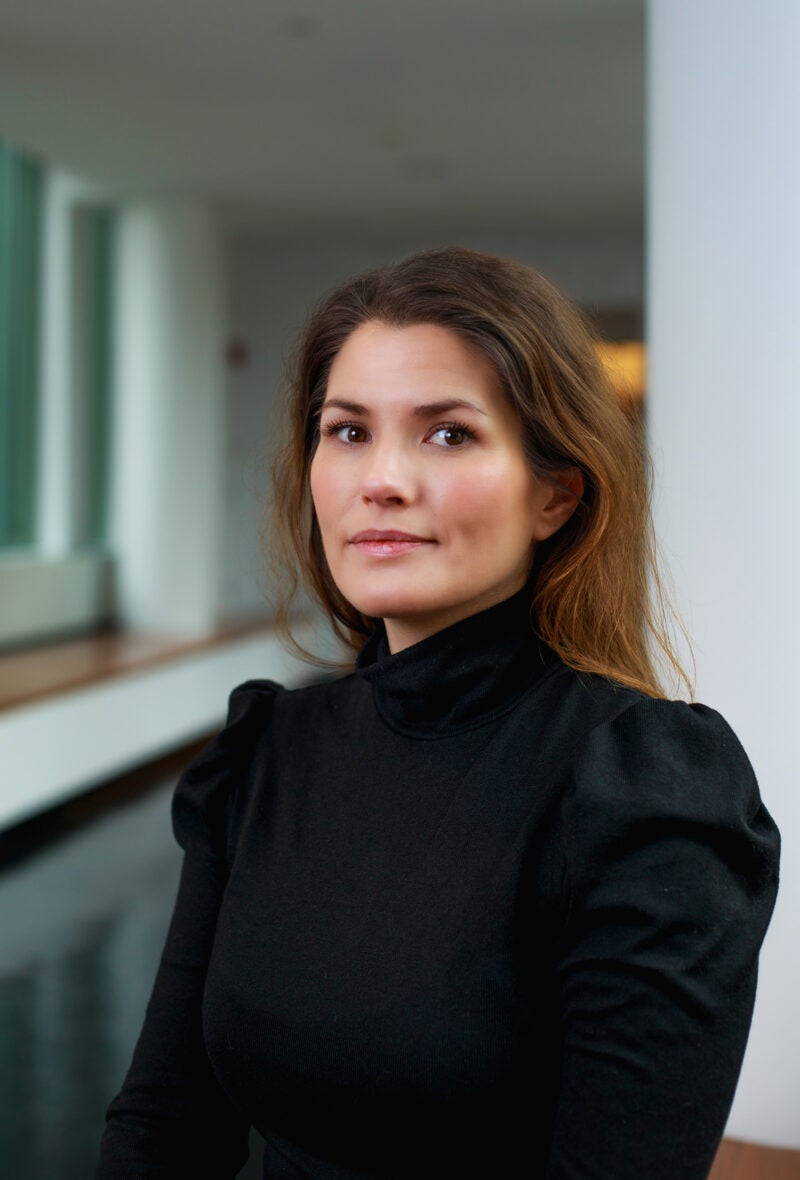Ásgerður Snævarr LL.M. ’23 is a legal adviser to the Prime Minister of Iceland and a part-time lecturer in administrative law at the University of Iceland. Previously, she worked for the Parliamentary Ombudsman. While furthering her career in government and pursuing her graduate degree at HLS, Snævarr is raising her daughter, Iðunn, 9, who was named on International Women’s Day after a Nordic goddess.
What brought you to HLS?
Mainly my interest in law, especially constitutional- and administrative law. Harvard’s reputation for excellence in those fields aligned closely with what I wanted to get out of the program. So, I thought that an opportunity to learn from some of the best and most knowledgeable in the field was both motivating and inspiring.
Also, I really wanted to deepen my knowledge. After working for a lawyer for several years now, I felt that it was time to pause and take a step back. When you first go to law school, you don’t really have that hands-on knowledge. So I thought it might be a good opportunity to go back to law school, take up studying again, having all that perspective. That was one of the big motivations for applying to HLS. [It was] also partly driven by a desire to constantly better myself, improving my abilities and skills, so that I can try and bring that back and be better at my job. I work in the prime minister’s office and I have often had great responsibilities. Therefore, it must also be my responsibility to be able and better and have a really deep, good understanding of what I am doing in order to bring good and sound advice.
What made you what made you pursue law as a career?
I think that understanding the law and the legal system is just such a core way to understand society. The laws touch almost every part of society, whether it be family disputes and the right of the child, or complicated financial regulations, how to buy real estate, get a mortgage. And it’s so social and dynamic. It’s not scientific—in a mathematical way—where there’s a formula and you have an answer. There are almost always arguments on both sides, and you have to weigh and balance competing interests. That’s maybe why I love it.
I decided to go to law school because I thought it was just so broad. You could basically do everything with it. My family is either journalists or lawyers, and there’s also politicians. You could study law and be a journalist or a politician. But in the end, I hadn’t expected to be so interested in the academia. I thought that law would just be like, the base [education] and I would do something else. But it turned out that I found I really enjoyed it.
I sometimes say that I’m paid to say “no, but…,” and both the “no” and the “but” are equally as important.
What do you like about working in academia? How does it compare with government work?
I have always been interested in pursuing a career in academia. But also, I think I would maybe miss the excitement and thrill of [government work]. In government, there is pressure. You’re doing something that is important now, and you can make a difference.
Do you have like a mission that you want to accomplish while you’re working in government?
My mission is good governance. I have seen up close how a well-run government can make a significant impact on society. As a legal adviser in a ministry my responsibilities are twofold, on the one hand we work for a democratically accountable minister, on the other hand we work for our country and the people. The job is to make sure that the ministers can implement their policies and make sound decision while at the same time safeguarding the constitution and the laws. I sometimes say that I’m paid to say “no, but…,” and both the “no” and the “but” are equally as important. So, my mission is to strive for excellence in government, by upholding the values of the law, transparency, and integrity to ensure that the government is serving the needs of its citizens effectively and efficiently.
You mentioned that your family were journalists and lawyers and politicians. Are there any women in your family who stand out as particular inspirations to you?
I’ve been lucky to have many female role models in my family. I would start with my aunt, Arna Schram. She was a feminist and advocate for women’s rights. She worked as a journalist for the most part and was the first woman in Iceland to be the president of the journalist union. She had been the editor of the Icelandic Women’s Rights Association magazine issued annually on June 19, a day dedicated to women’s suffrage in Iceland.
[There’s also] my grandmother, Valborg Sigurðardóttir. She was the first dean of the Icelandic Teacher College. Back then it was not common for women to seek higher education. Although she had been the valedictorian in 1941, she was snubbed of the “big grant” (as it was called). The reason given was that women would go abroad, marry, and not come back home. She fought it and eventually came out on top, traveling to the United States during World War II and coming back with a master’s degree from Smith College.
My dad’s sister, Sigríður Ásdís Snævarr, was also the first woman to be appointed an ambassador by Iceland.
Want to stay up to date with Harvard Law Today? Sign up for our weekly newsletter.
